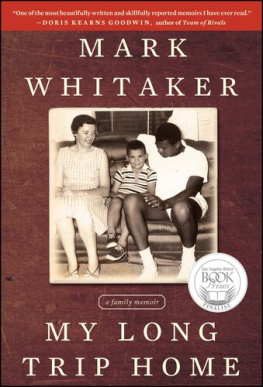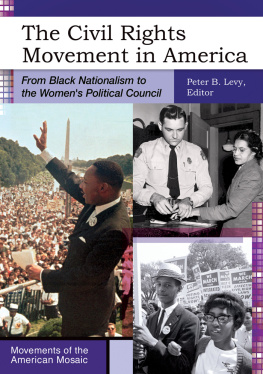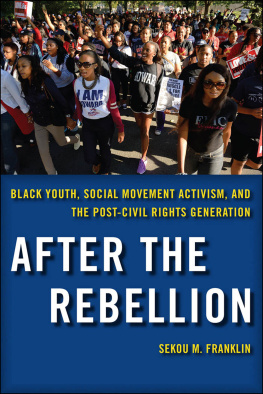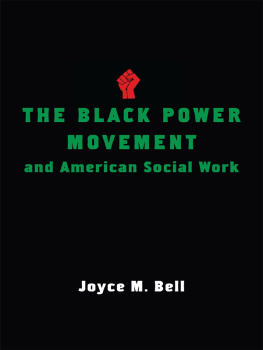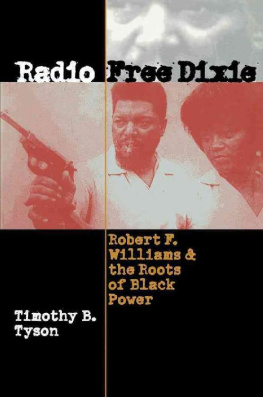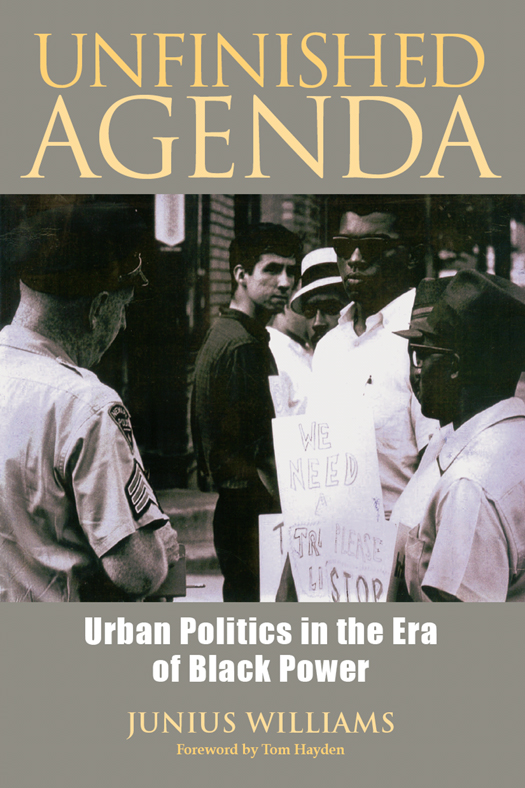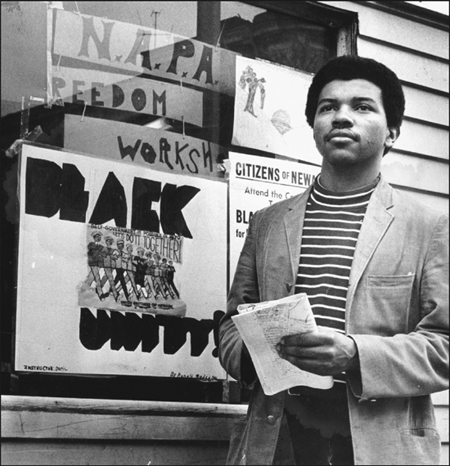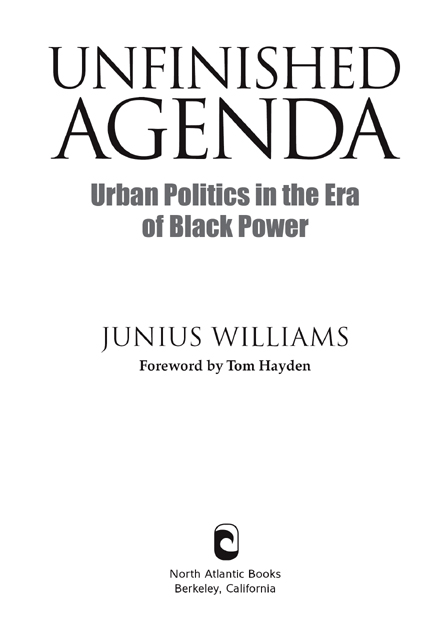Junius Williams in front of the building of his community organization, the Newark Area Planning Association (NAPA), 1968.
Electronic Edition: ISBN 978-1-58394-723-4
Copyright 2014 by Junius Williams. All rights reserved. No portion of this book, except for brief review, may be reproduced, stored in a retrieval system, or transmitted in any form or by any meanselectronic, mechanical, photocopying, recording, or otherwisewithout the written permission of the publisher. For information contact North Atlantic Books.
Published by
North Atlantic Books
P.O. Box 12327
Berkeley, California 94712
Cover and book design by Brad Greene
Unfinished Agenda: Urban Politics in the Era of Black Power is sponsored by the Society for the Study of Native Arts and Sciences, a nonprofit educational corporation whose goals are to develop an educational and cross-cultural perspective linking various scientific, social, and artistic fields; to nurture a holistic view of arts, sciences, humanities, and healing; and to publish and distribute literature on the relationship of mind, body, and nature.
North Atlantic Books publications are available through most bookstores. For further information, visit our website at www.northatlanticbooks.com or call 800-733-3000.
The Library of Congress has cataloged the printed edition as follows: Williams, Junius, 1943
Unfinished agenda : urban politics in the era of Black Power / Junius Williams.
pages cm.
ISBN 978-1-58394-722-7
1. Williams, Junius, 1943- 2. African AmericansCivil rightsHistory20th century. 3. African AmericansPolitics and government20th century. 4. Civil rights movementsUnited StatesHistory20th century. 5. Black powerUnited StatesHistory20th century 6. Community organizationNew JerseyNewark20th century. 7. Newark (N.J.)Politics and government20th century. 8. African American civil rights workersBiography 9. African American lawyersBiography. I. Title.
E185.97.W728A3 2013
323.092dc23
[B]
2013008255
v3.1
This book is dedicated to my parents, Maurice Lanxton and Bernyce White Williams, who started me on my way. They nourished and supported me with ideas and opportunities, and in their own way saw to it that I became successful. They have passed on to Glory, but their spirit is with me always.
This book is also dedicated to my younger brother Johnny (John Williams). We have always been there for each other; certainly he is there for me today whenever I need brotherly love and support.

Acknowledgments
This book was bound to happen, but it took a long time. I wrote on paper napkins, on church bulletins during church services, and on yellow legal pads. I have about forty seventh-grade Compositions notebooks, filled with notes and rough drafts. I wrote whenever and wherever I was inspired. During that time, many people came into the life of my beloved manuscript, and to some of them I feel grateful and indebted.
Diane Patrick, Deirdre Cross, and Jed Bickman edited the manuscript, helping me to shape and refine my chapters. They gave me confidence about the value of the book and helped me eventually attract the publisher.
Unfinished Agenda is what I call in the Introduction a historical memoir, and so I didnt trust my memory and judgment alone. I cultivated my own voice as I was instructed to do, but other people helped provide the glue that holds my story together from chapter to chapter. I interviewed many people to get their recollection and opinions about the way things happened. I want to say thank you to the following: Phil Hutchings, George Fontaine, Ray Trent, Don Melafronte, Stanley Aronowitz, Louise Epperson, J. Harry Smith, Wyla McClain, George Richardson, Mary Darden, Dudley Christie, Jim Walker, Tom Parks, Alma Perry, Gus Heningburg, Juliet Grant, Roger Smith (Newman), Derek Winans, Eulis Honey Ward, Terry Jefferson, Earline Provit, Ma Jackson, Carl Sharif, Betty Morse, Sandy Gallanter, Rita Williams, Joe White, Joe Scrimmager, Ramon Rivera, Alphonso Roman, Jerry Chambers, Donald Harris, Verner Henry, Sally G. Carroll, Richard Cammerieri, Wilhelmina Holder, Professor Michael Nash, and Charles Geyer. (Stanley Aronowitz and Phil Hutchings gave me interviews as early as 1989.)
Still others helped me when I read their books and other writing, or when I listened to them speak at community forums or in my class when I taught political science at Rutgers UniversityNewark as an adjunct professor (1992), or at Abbott Leadership Institute classes between 2002 and 2012. Some people gave me little snippets of information or insight in private conversations. Thank you to Amiri Baraka, Tom Hayden, James Forman, Larrie Stalks, Calvin West, Carol Graves, Clem Price, Claude Brown, Rev. Levin West, former mayor Ken Gibson, Senator Ron Rice, Judge Clarence Faines, Bob Curvin, Kwame Ture (Stokely Carmichael), Tiny Prince, Carol Glassman, Reuben Johnson, Jill Hamberg, Steve Block, Corrina Fales, former mayor Sharpe James, Marcia Brown, Kabili Tayari, Eugene Campbell, John Crump, Komozi Woodard, and O.T. Wells.
I want to thank my friends in the Student Nonviolent Coordinating Committee (SNCC) for teaching me street survival skills and giving me the Movement credentials I needed to move from the South to the North; those in the Students for a Democratic Society (SDS) and in the Newark Community Union Project (NCUP) for teaching me how to organize. I want to thank my friends and comrades in the Newark Area Planning Association (NAPA) for letting me be their leader, and backing my play on so many occasions. I want to thank my friends in the National Bar Association, who let me be their president at the age of thirty-four, and have cheered for me in whatever endeavor I have undertaken after that one year in office. And then there are the musicians and friends in Return to the Source: Guys, you saved my life, turned me completely around. I thank my classmates in Richmond, Virginia, from the class of 1961 at Armstrong High School who have supported me through the yearsand those of you who went to Maggie Walker as well! We started on our way. Then there are the members of my church families at Greater Abyssinian Baptist and Bethany Baptist Churches. And last but not least, I want to thank my parents, community activists, teachers, and students in the Abbott Leadership Institute (ALI) for letting me be myself again and again and again. You get me ready and excited for the next round. Without the people in these groups and organizations, there would be no story worth telling.
During the writing stage, each month my manuscript kept growing and growing, until my wife, Annie, a.k.a. Dr. Antoinette Ellis-Williams, told me You got more than enough for any one book, so why dont you just stop. One day I took her advice and found out I had 1,100 pages (double-spaced). She supported me with love that was full of humor and compassion. I couldnt have written the book in a home where there was an absence of these vital ingredients. Thank you, and I love you.
And then there are my four children, who love me but enjoy roughing me up with their jokes, challenges, and irreverence for the little excerpts I gave them from time to time. I kept writing anyway, even when they wouldnt read the unfinished


